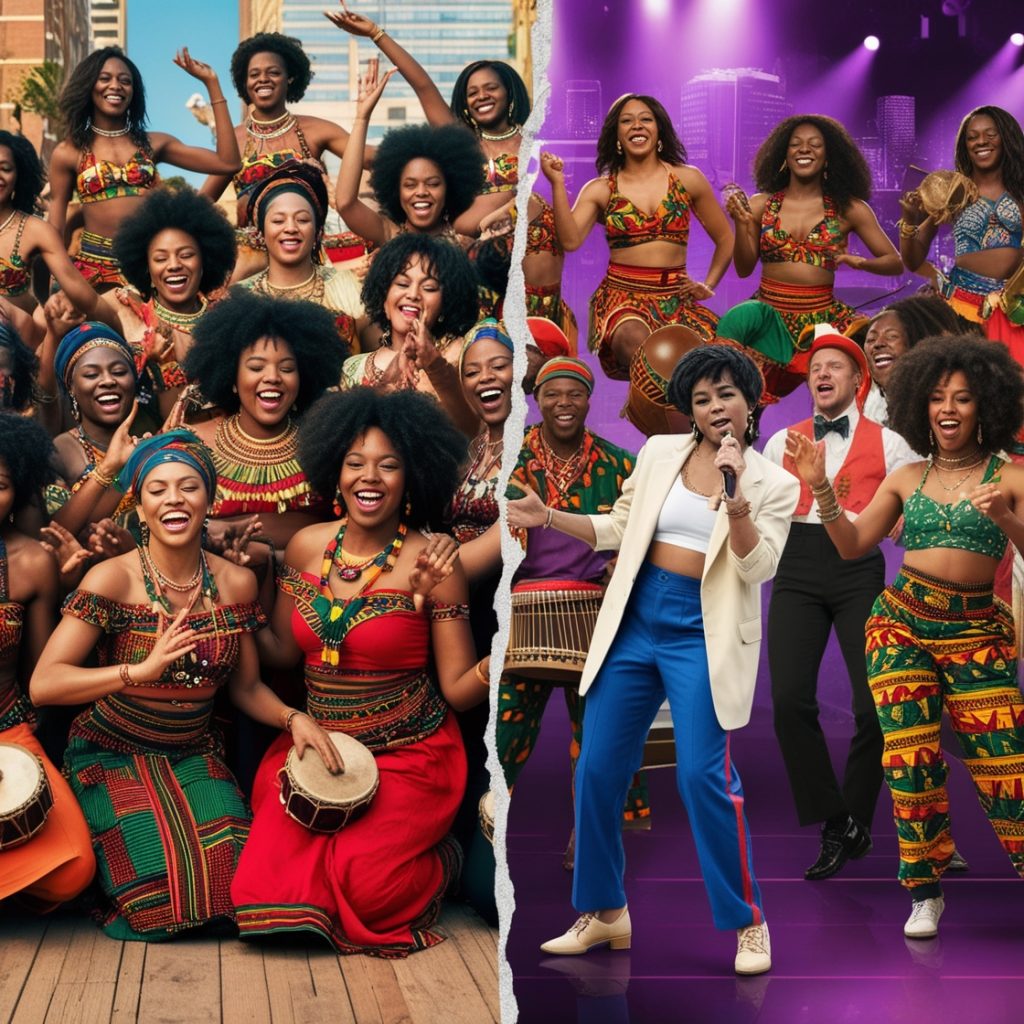Summary:
In the ongoing debate of cultural appropriation vs. appreciation in music genres, understanding the difference is crucial. Appropriation exploits, while appreciation elevates. As Black women, we have the power to call out when our culture is being used without respect and celebrate when it’s being honored the way it should be. Let’s continue to protect our culture and encourage others to do the same with respect and admiration.

Introduction:
Cultural appropriation vs. appreciation it’s a conversation that’s hard to avoid, especially in the world of music. As Black women, we’ve seen our culture celebrated, borrowed, and sometimes outright stolen. From the infectious rhythms of Afrobeats to the soulful croons of jazz, Black music has shaped global sounds for generations. But how do we know when someone is truly appreciating our culture versus simply exploiting it for profit? Let’s dive into the topic of Cultural appropriation vs. appreciation in music genres and break down where the line is drawn. Grab your headphones and let’s vibe through this.
Cultural Appropriation vs. Appreciation: What’s the Difference?
Before we jam too hard, let’s talk about what cultural appropriation vs. appreciation actually means.
Cultural appropriation happens when someone from a dominant culture takes elements of a marginalized culture like music, fashion, or even language without understanding or respecting its history. Imagine someone remixing your playlist without even acknowledging you made it.
Cultural appreciation, on the other hand, is when someone genuinely understands, respects, and gives credit to the culture they’re drawing from. It’s more like vibing with your playlist and shouting you out for your fire track selection.
Classification: Borrowing or Stealing?
When it comes to music, cultural appropriation vs. appreciation is where the line often gets blurry. We live in a world where beats, melodies, and styles are traded across cultures like vinyl records. So how do we classify whether someone is borrowing respectfully or just straight-up stealing?
The key here is intent and acknowledgment. When a non-Black artist borrows elements from Black genres like hip-hop, R&B, or gospel without understanding the history behind those sounds—without honoring the struggles and the culture that’s cultural appropriation. They’re just taking the funk and forgetting the fight.
However, if an artist takes the time to learn the roots, gives credit to the genre’s pioneers, and acknowledges the cultural significance behind the sound, then that’s appreciation. It’s love, not theft.
Generalization and Examples: Where Does the Line Get Crossed?
To break down cultural appropriation vs. appreciation, let’s look at a few examples. Remember when Miley Cyrus went through her Bangerz phase and suddenly became obsessed with twerking? That’s a prime example of cultural appropriation. She borrowed a Black cultural element for shock value, capitalized on it, and then quickly moved on, leaving the Black community she borrowed from without any credit or compensation. Classic case of taking without giving back.
On the flip side, consider someone like Adele or Amy Winehouse, who borrowed heavily from Black music traditions like jazz and soul. These artists were careful to acknowledge their Black influences, often crediting their inspirations in interviews and collaborations. While they made a name for themselves with Black sounds, they were careful to show respect, making their acts more about appreciation than appropriation.
FAQ: Clearing Up the Confusion
Let’s answer some common questions about cultural appropriation vs. appreciation in music.
- Can non-Black artists perform Black music without being accused of cultural appropriation?
Yes, but only if they do it with deep respect for the culture. This means acknowledging where the music comes from, understanding its history, and giving credit to Black creators. - Is it possible to appreciate a culture without being a part of it?
Definitely! Cultural appreciation doesn’t require you to live within a culture, but it does require you to show respect and give credit to the origins of what you’re borrowing. - Why does cultural appropriation vs. appreciation even matter?
It matters because appropriation strips marginalized communities of their contributions, while appreciation elevates and honors them.
Cause and Effect: How Appropriation Harms Black Creators
So, why is cultural appropriation vs. appreciation such a big deal? The effect of appropriation in music is not just about hurt feelings; it has financial and social consequences. When non-Black artists appropriate Black music, they often profit in ways that Black creators can’t. Think about Elvis Presley, who gained massive fame and wealth by performing music that was heavily influenced by Black sounds, while Black artists at the time struggled to even get airtime.
This isn’t just an old problem, though. Today, when a mainstream artist appropriates Black music without giving back to the community, it erases the visibility of Black creators and diminishes their opportunities. The cycle of exploitation continues, leaving Black artists sidelined while someone else cashes in on their culture.

Comparison/Contrast: Cultural Appropriation vs. Appreciation in Music
So what’s the real difference? Cultural appropriation says, “This is mine now,” while cultural appreciation says, “I respect where this comes from.” One takes credit, the other gives it. Appropriation is like copying your homework and slapping your name on it, while appreciation is giving you the credit for inspiring the answer.
When our music gets appropriated:
- Black artists often get sidelined in their own genres.
- Stereotypes can get reinforced.
- Our rich cultural history gets watered down.
But when it’s appreciated:
- Cross-cultural understanding improves.
- Collaborations can create amazing new sounds.
- Our influence gets rightfully recognized.
The Battle of the Beats: Appropriation vs. Appreciation
| Appropriation | Appreciation |
|---|---|
| Stealing | Learning |
| Mocking | Respecting |
| Profiting without credit | Collaborating and crediting |
| Surface-level imitation | Deep understanding |
For example, when Beyoncé released Black Is King, she wasn’t just using African music for a vibe she was honoring African traditions, artists, and storytelling. That’s cultural appreciation. On the flip side, when Madonna “borrowed” voguing an art form from Black and Latinx queer communities—she did it without fully understanding or acknowledging the deep cultural roots behind it. That felt like appropriation.
List: How to Spot Cultural Appropriation vs. Appreciation in Music
- Does the artist claim to innovate without acknowledging cultural roots?
- Are they profiting from a culture without contributing back to it?
- Are they using stereotypical or shallow representations of the culture?
- Have they erased the original creators from the narrative?
- Are they actively supporting the marginalized community they’re borrowing from?
Sequence: How to Appreciate a Music Genre Without Appropriating It
- Research: Dive deep into the genre’s history, especially its cultural roots.
- Acknowledge: Always give credit to the original creators and influencers.
- Engage: Support Black artists who are keeping the genre alive today.
- Respect Boundaries: Not every element of a culture is up for grabs.
- Elevate: Use your platform to highlight the voices of those within the culture.
Conclusion: Cultural Appropriation vs. Appreciation—Where Do You Stand?
At the end of the day, the difference between cultural appropriation vs. appreciation in music comes down to one word: respect. Black music isn’t just a collection of sounds; it’s a narrative of resilience, joy, pain, and triumph. As Black women, we know what it feels like to have our culture taken and commodified. The next time you hear a non-Black artist dip into Black sounds, ask yourself: Are they celebrating the culture, or just cashing in?


